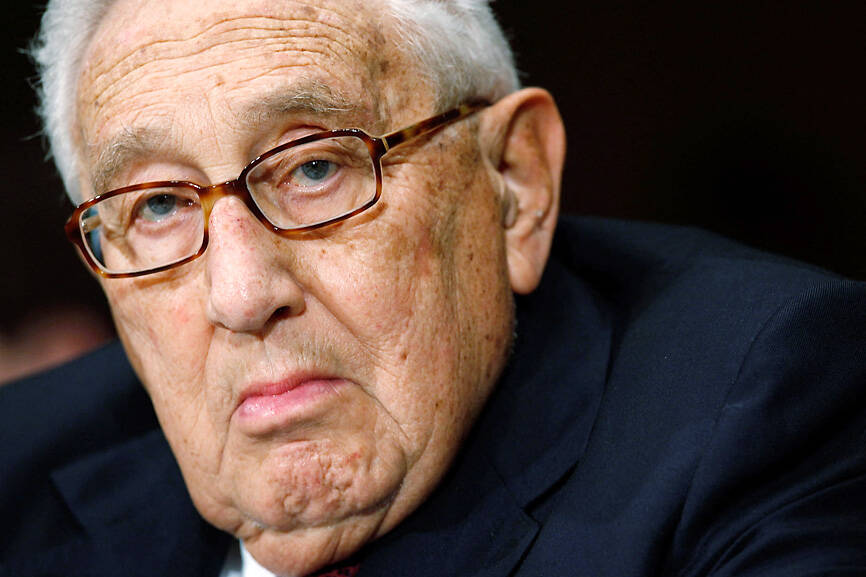Former US secretary of state Henry Kissinger, the diplomat with the thick glasses and gravelly voice who dominated foreign policy as the US extricated itself from Vietnam and broke down barriers with China, died on Wednesday, his consulting firm said.
He was 100.
With his gruff yet commanding presence and behind-the-scenes manipulation of power, Kissinger exerted uncommon influence on global affairs under US presidents Richard Nixon and Gerald Ford, earning vilification and the Nobel Peace Prize. Decades later, his name still provokes impassioned debate over foreign policy landmarks long past.

Photo: AFP
Kissinger’s power grew during the turmoil of Watergate, when the politically attuned diplomat assumed a role akin to copresident to the weakened Nixon.
“No doubt my vanity was piqued,” Kissinger later wrote of his expanding influence. “But the dominant emotion was a premonition of catastrophe.”
A Jew who fled Nazi Germany with his family in his teens, Kissinger in his later years cultivated the reputation of respected statesman, giving speeches, offering advice to Republicans and Democrats alike and managing a global consulting business. He turned up in former US president Donald Trump’s White House on multiple occasions.
However, Nixon-era documents and tapes, as they trickled out over the years, brought revelations — many in Kissinger’s own words — that sometimes cast him in a harsh light.
Never without his detractors, Kissinger after he left government was dogged by critics who argued that he should be called to account for his policies on Southeast Asia and support of repressive regimes in Latin America.
For eight restless years — first as national security adviser, later as secretary of state, and for a time in the middle holding both titles — Kissinger ranged across the breadth of major foreign policy issues. He conducted the first “shuttle diplomacy” in the quest for Middle East peace. He used secret channels to pursue ties between the US and China, ending decades of isolation and mutual hostility.
He initiated the Paris negotiations that ultimately provided a face-saving means — a “decent interval,” he called it — to get the US out of a costly war in Vietnam. Two years later, Saigon fell to the communists.
And he pursued a policy of detente with the Soviet Union that led to arms control agreements and raised the possibility that the tensions of the Cold War and its nuclear threat did not have to last forever.
SEE KISSINGER’S ON PAGE 5

‘ABUSE OF POWER’: Lee Chun-yi allegedly used a Control Yuan vehicle to transport his dog to a pet grooming salon and take his wife to restaurants, media reports said Control Yuan Secretary-General Lee Chun-yi (李俊俋) resigned on Sunday night, admitting that he had misused a government vehicle, as reported by the media. Control Yuan Vice President Lee Hung-chun (李鴻鈞) yesterday apologized to the public over the issue. The watchdog body would follow up on similar accusations made by the Chinese Nationalist Party (KMT) and would investigate the alleged misuse of government vehicles by three other Control Yuan members: Su Li-chiung (蘇麗瓊), Lin Yu-jung (林郁容) and Wang Jung-chang (王榮璋), Lee Hung-chun said. Lee Chun-yi in a statement apologized for using a Control Yuan vehicle to transport his dog to a

INDO-PACIFIC REGION: Royal Navy ships exercise the right of freedom of navigation, including in the Taiwan Strait and South China Sea, the UK’s Tony Radakin told a summit Freedom of navigation in the Indo-Pacific region is as important as it is in the English Channel, British Chief of the Defence Staff Admiral Tony Radakin said at a summit in Singapore on Saturday. The remark came as the British Royal Navy’s flagship aircraft carrier, the HMS Prince of Wales, is on an eight-month deployment to the Indo-Pacific region as head of an international carrier strike group. “Upholding the UN Convention on the Law of the Sea, and with it, the principles of the freedom of navigation, in this part of the world matters to us just as it matters in the

Taiwan yesterday denied Chinese allegations that its military was behind a cyberattack on a technology company in Guangzhou, after city authorities issued warrants for 20 suspects. The Guangzhou Municipal Public Security Bureau earlier yesterday issued warrants for 20 people it identified as members of the Information, Communications and Electronic Force Command (ICEFCOM). The bureau alleged they were behind a May 20 cyberattack targeting the backend system of a self-service facility at the company. “ICEFCOM, under Taiwan’s ruling Democratic Progressive Party, directed the illegal attack,” the warrant says. The bureau placed a bounty of 10,000 yuan (US$1,392) on each of the 20 people named in

The High Court yesterday found a New Taipei City woman guilty of charges related to helping Beijing secure surrender agreements from military service members. Lee Huei-hsin (李慧馨) was sentenced to six years and eight months in prison for breaching the National Security Act (國家安全法), making illegal compacts with government employees and bribery, the court said. The verdict is final. Lee, the manager of a temple in the city’s Lujhou District (蘆洲), was accused of arranging for eight service members to make surrender pledges to the Chinese People’s Liberation Army in exchange for money, the court said. The pledges, which required them to provide identification